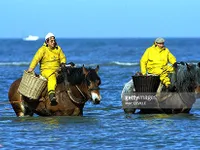
On the windswept shores of Oostduinkerke, Belgium, where the grey waves of the North Sea break cold against the sand, an ancient ritual still unfolds. It has for more than seven centuries, unchanged by time, weather, or the march of technology.
There, you will find not boats or modern trawlers, but men on horseback — paardenvissers, or horse fishermen — wading into the surf to harvest shrimp in a way so rare that Oostduinkerke is now the last place on Earth where it survives.
Only 19 fishermen remain. But when they ride out, history rides with them.
Giants of the Sea

The horses are the true marvels of this tradition. Massive Brabant draft horses, each weighing more than 2,000 pounds, move steadily into the sea. Their sheer size and strength make them uniquely suited to the task. With hooves planted firmly, they wade through the surf, untroubled by the cold waters that would buckle a lesser animal.
Behind them drags a wide net, its wooden frame held steady by chains that jangle against the seafloor. The sound startles the grey shrimp from their hiding places, driving them upward into the trap. It is a process that relies not only on brute force but on an intricate dance between man, horse, and sea.
To guide such a horse, keep the net balanced, and manage the delicate haul of shrimp requires years of training and instinct. It is considered one of the most difficult fishing methods ever devised.
Power and Fragility
The contrast is striking: colossal horses pulling against the push of the sea, working tirelessly to collect creatures no bigger than a fingertip. Each net is emptied into wicker baskets slung along the horse’s sides. The prized grey shrimp are then taken to shore, where they will be sorted, rinsed, and, in many cases, cooked on the spot.
In Belgium, these shrimp are not just food — they are heritage. Peeled by hand, tossed into croquettes, or served with fresh bread and butter, they carry the taste of the sea and the weight of centuries of tradition.
A Vanishing Craft
Once, this method of fishing was common along the North Sea coast. Today, Oostduinkerke alone keeps it alive. Mechanized trawlers long ago replaced horses in most places, but here the paardenvissers endure, supported by the local community and recognized by UNESCO as part of the world’s Intangible Cultural Heritage.
It is not an easy livelihood. The sea is unpredictable, the horses require constant care, and the yield is modest compared to industrial methods. But for the men who practice it, the value lies not in volume, but in legacy.
When a fisherman mounts his horse and rides into the surf, he is not only catching shrimp — he is carrying forward the labor of ancestors, preserving a link to the past that might otherwise be lost.

The Soul of Oostduinkerke
Tourists gather on the beach to watch, drawn as much by the spectacle as by the shrimp itself. They see horses trudging shoulder-deep into the waves, fishermen balancing centuries of skill, and baskets filling slowly with the sea’s hidden harvest.
But for the paardenvissers, it is more than performance. It is identity. It is resilience. It is proof that even in a world of speed and efficiency, there is still room for traditions that value patience, strength, and harmony with nature.

As long as even a handful of men ride their draft horses into the surf, the legacy of Oostduinkerke will endure — powerful horses pulling delicate nets, the ocean surrendering its secrets, and a community bound together by the oldest kind of wealth: tradition handed down from one generation to the next.




